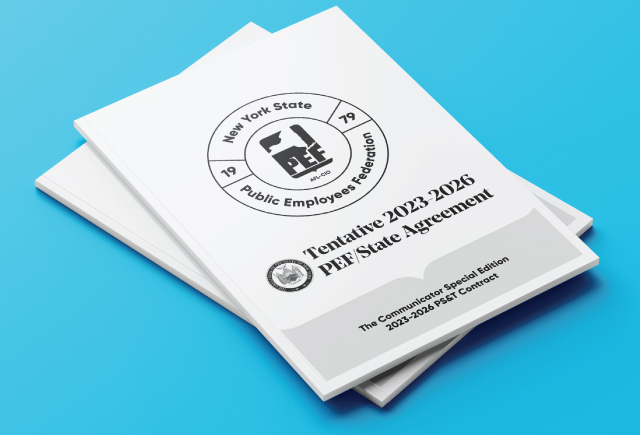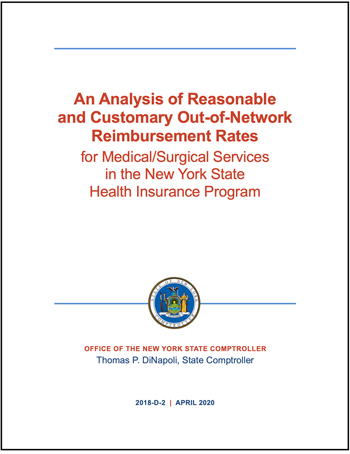July 5, 2023 — The tentative PEF/State agreement for 2023-2026 includes changes to the health insurance and dental benefits available to PEF members.
 Dental benefit changes
Dental benefit changes
As a result of PEF consistently raising the issue of the inadequacy of the EmblemHealth dental network, the State agreed to put its dental services contract out to bid as part of PEF’s last collective bargaining agreement, signed in 2021. Unfortunately, the State did not release its RFP (Request for Proposals) until May 2023, almost two years later. As a result, the PEF/State 2023-2026 tentative agreement establishes a $400 annual dental stipend payable to PEF members enrolled in the dental plan until the State enters into a new dental services contract. If ratified, members will receive the $400 stipend for 2023 as soon as practicable after ratification. Thereafter, payments will made in the beginning of each applicable fiscal year – April or May depending on the State payroll – until New York enters into a new dental services contract. It is important to note that this dental stipend is in addition to the EmblemHealth dental benefit, not a replacement for it. This is a significant financial concession by the State, totaling more than $20 million annually for PEF’s approximately 50,000 eligible members. We believe this will incentivize the State to honor its commitment to obtain a vendor that can provide a better dental network for PEF members.
In addition, while the State works to either modify the dental contract with EmblemHealth or comes to terms with another provider, the State has advised that members will now be able to take advantage of a new benefit called Single Case Agreements (SCA) through which members can reduce their out-of-pocket expenses.
Under the SCA program, if there are no participating providers available for emergency or routine dental care, EmblemHealth is to ensure dental services are provided at the in-network level of benefits with a non-participating provider; this applies when clinically appropriate, or to address access issues to dentists and specialists. Approval must be obtained prior to receiving treatment by calling Customer Service at 1-800-947-0101.
EmblemHealth’s network team will coordinate care with a non-participating provider when necessary, and the member will only be responsible for the in-network cost for the arranged service. If a provider is not willing to accept direct payment from Emblem as part of the SCA, Emblem guarantees members will be reimbursed for the provider’s billed amount up to the maximum allowance according to the Certificate of Insurance. The state further advised that while EmblemHealth continues efforts to retain and recruit network providers, they are committed to working with members and will exhaust all efforts in finding a provider to ensure members receive necessary care. Again, those looking to utilize the SCA program must contact EmblemHealth before each service is performed and have their case approved by EmblemHealth.
Health insurance changes
There are no increases to the employee premium percentage contribution or increases to co-payments in this agreement. Among some of the health insurance changes are the following (for more, please see the Highlights (pages 1-3) and Gains & Trade-Offs (pages 4-12) of the Tentative 2023-2026 PEF/State Agreement in the Special Communicator Edition mailed to all members, or click here to view them online.)
Dependents will be eligible for dental and vision coverage until 26 years of age regardless of student status. All covered services within a single visit by a participating provider will be covered by a single co-pay. However, if a provider, for example, sends a test out to a lab for analysis, there will be an additional co-pay as that would be a different provider. There will be a 20-visit per year limitation on medically necessary therapeutic massage as well as medically necessary out-of-network acupuncture services.
There will be a significant change in how out-of-network (OON) providers are reimbursed by the Empire Plan. Currently, OON providers are paid based on “reasonable and customary charges;” that is, the provider’s actual charge, usual charge, or the usual charges of other providers in the area. OON providers will now instead be paid based on 275% of the Medicare rate. This change is intended to help contain Empire Plan costs, which is important not only to the State but to PEF members who pay a share of the annual premium through their bi-weekly payroll deductions.

This change was driven in large part by this 2020 report from the Office of the State Comptroller, which found that OON costs are often significantly higher than in-network costs for the same exact services. For example, the report noted that the average reimbursement for a routine office visit in 2016 was $29 for in-network care and $147 for OON. The report also noted discrepancies among OON providers across the State as well as in neighboring areas. For example, a specific spinal procedure in Suffolk County was $38,000, while the same procedure in the Niagara Falls region was just $167. And among neighboring areas, the report found that another spinal procedure was $90,000 in the Far Rockaway/Hempstead region, double the rate for the same procedure in both neighboring regions of Port Washington/Great Neck ($43,755) and Flushing/Jamaica ($45,000). The report also noted the potential for providers in a particular region, knowing that their reimbursement rates are based on area billings, to bill higher than necessary to drive up the reimbursement rates in that region. Those high OON reimbursements contribute to increased premiums which are paid in part by PEF enrollees.
Enrollees who continue to use OON providers may see an increase in out-of-pocket expenses. These increases will depend on how the OON providers balance bill for their services. However, there is a safety net for enrollees who do not have access to certain in-network providers through the medical access program which provides paid-in-full benefits – minus appropriate co-pays – when there are no participating providers available within access standards. (See Appendix VII of the Tentative Agreement for information about access standards.) It is anticipated that the change in the OON reimbursement rate to 275% of the Medicare rate may drive some OON providers to join the Empire network, since they will no longer be reimbursed based on the prior usual and customary model.
Another health insurance change is the establishment, as soon as practicable after ratification, of a Center of Excellence (COE) for substance use treatment. As with the other already existing COEs for fertility services and cancer treatment, enrollees using this benefit will be entitled to reduced costs, travel and meal allowances in addition to other benefits. Most importantly, the existing COEs have proven to provide members with improved outcomes.
PEP options increased to help offset healthcare costs
The 2023-2026 Tentative Agreement makes some important changes to the Productivity Enhancement Program, or PEP. PEP lets members cash in vacation and personal leave to pay their healthcare insurance premium.
If ratified, the agreement increases the number of days that can be cashed in to eight for employees up to Salary Grade 17, and five days for Grades 18-24. Also, if ratified, the Teacher’s PEP program will allow for the use of floating and compensatory days in addition to personal days. In addition, PEP no longer “sunsets,” meaning the program doesn’t have a set expiration date. It will be up to either PEF or the State to propose changes to it in future agreements, if either party wishes to do so.
The PEF Contract Team worked hard to reflect members’ priorities in this tentative agreement. Holding the line on health insurance premiums and co-pays was a priority as was putting pressure on the State to enter into a new dental services contract with a stipend to members until that is accomplished. The tentative agreement represents progress toward both those goals and will also help control rising healthcare costs.

